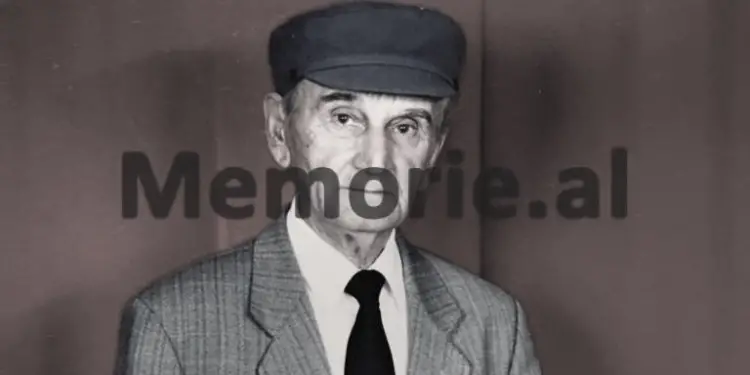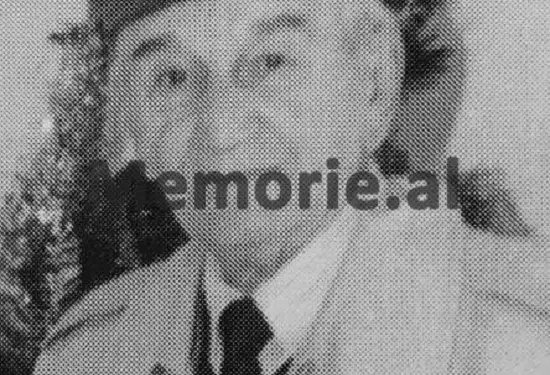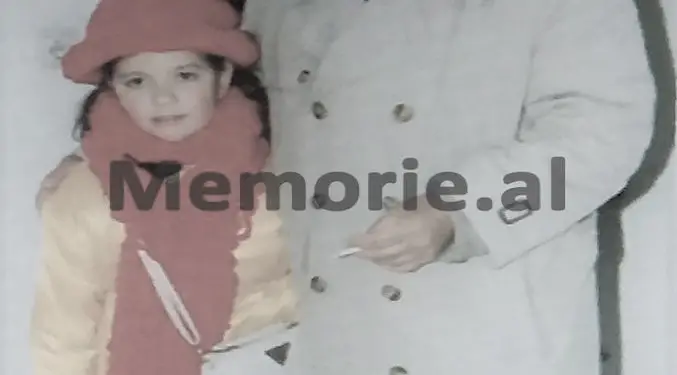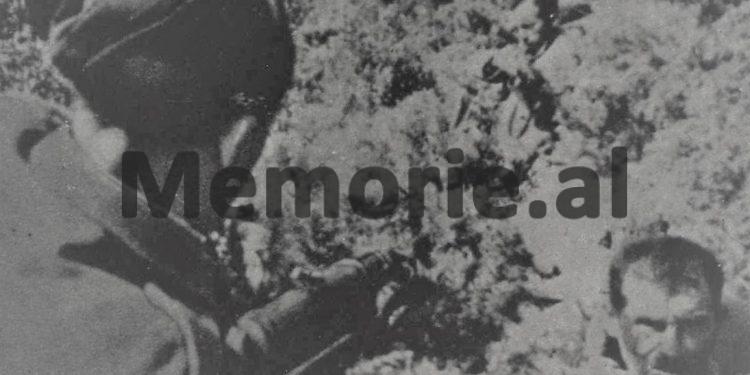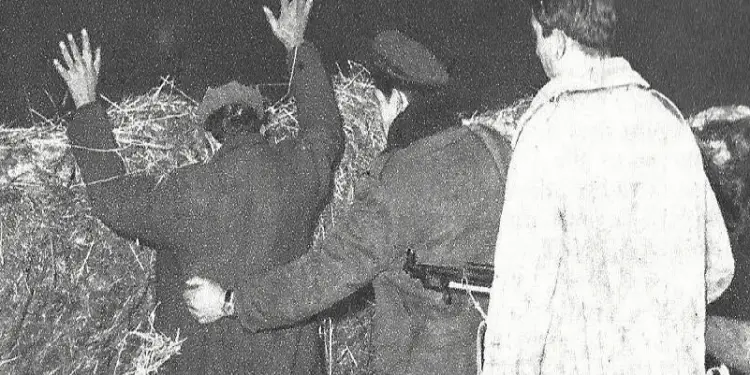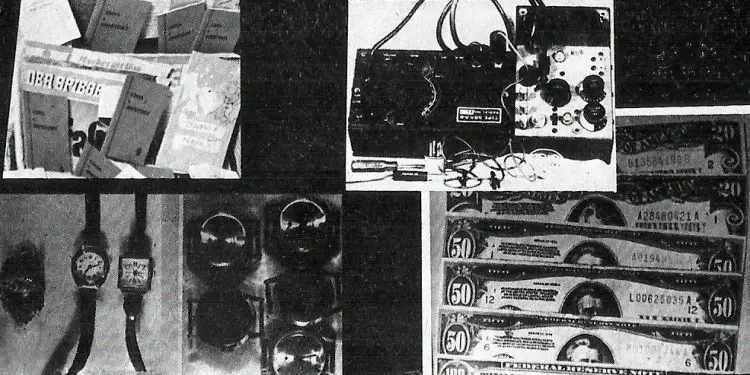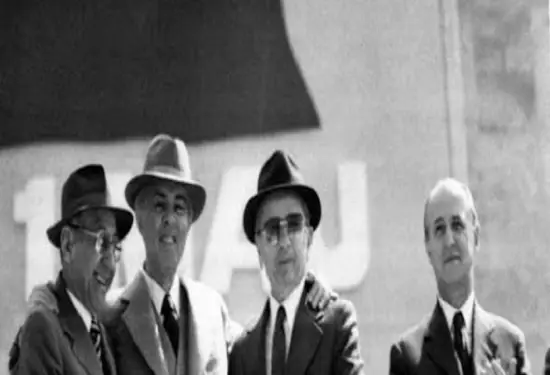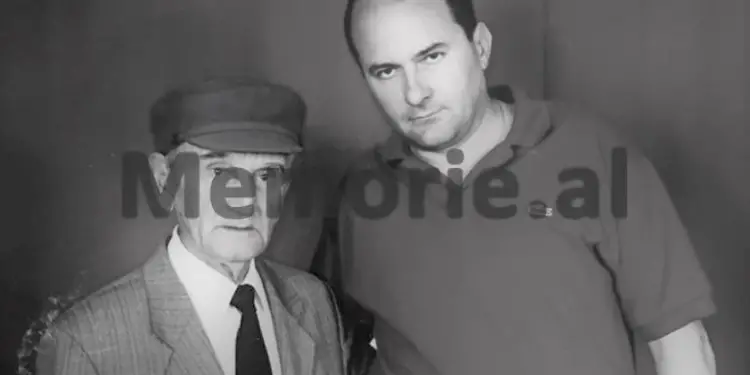Dashnor Kaloçi
Second part
Memorie.al publishes the unknown and rare story of Avdul Hakan Banushi from the village of Golem in Gjirokastra, who during the occupation of the country (1939-1944), unlike his entire family who joined the forces partisan, he joined the ranks of the nationalist youth organization “Balli Kombëtar” in the city of Durrës, where he was arrested by German forces in October 1943 and together with 73 other people were initially sent to the German Camp in Prishtina, and then to the mass extermination camps at Landesberger and Daku, from where he could only be released in 1945, after the intervention of Anglo-American forces. Banushi returned to Albania in 1945, after staying for some time in the Reggio-Emilia camp in Italy (where at that time were also some of the main leaders of Balli and Legality led by the myths Frashëri and Abaz Kupin) and his arrest a few days after arriving home, after at the Lapraka airport, the partisan guards found a letter given to him by the former Prefect of Gjirokastra, Rasim Babameto, while they were in Reggio-Emila. Banush was sentenced to 18 years in prison, accused of being an “agent of the Anglo-Americans” and released in 1961, where he did not spend much time with his family in the village of Golem, after being arrested again while interned in the town of Fier, from where he managed to escape from prison the first night and fled in the direction of Gjirokastra, where he crossed the state border and went to Greece, where he soon gained political asylum in the United States. Banushi’s engagement in the ranks of the Albanian political diaspora in the West as a member of the “Free Albania Committee”, where in 1973, after being trained by the CIA, he came several times with secret missions to Albania, in order to assassinate Enver Hoxha in the big parade of November 29, 1974, on the occasion of the 30th anniversary of the liberation and his arrest in 1975 near the border of Hani i Hotit, after a trap set by the Minister of Internal Affairs, Kadri Hazbiu, from where he would then be isolated for two years in the cells of ‘Ward 313’ in Tirana Prison and then in Burrel, from where he could only be released in early 1991.
“When Albania’s first contradictions with the People’s Republic of China began in 1972-’73, it added even more to our confidence that the time had come to organize concrete measures for a possible landing in Albania. After the previous talks of the leaders of the “Free Albania” Committee with Mr. Joseph Shisko, Deputy Secretary of State and Major Thomas Smith covering the Albanian political emigration to the USA, in January 1974, the Presidency of the Organization The “Albanian Anti-Communist Resistance Front” decided to send to Albania the first group, which would consist of five people. Among the main tasks that the group would perform were: ‘Meetings with people dissatisfied with the communist regime, the demolition of the Stalin and Lenin monument in the center of Tirana, the blowing up of the headquarters of the Central Committee of the ALP, the distribution of anti-communist propaganda materials that had been prepared before in New York, etc. It was decided that the first group would be led by me, as I was acquainted with the contingent of families persecuted by the communist regime, where we would initially rely. Apart from me, this group also included I. Rrushiti, N. Banushi, I. Lame and A. Sula. After some intensive preparations we made on a secret basis, we finally set off on the plane that would traverse the itinerary: New York – London, – Amsterdam – Rome – Athens. When we arrived in the Greek capital, we took refuge in the Hotel “Atlantik” and the next day we went to the military base of Preveza, where the colonel who was waiting for us supplied us with weapons consisting of five automatic weapons, five pistols, 20 grenades, 6 kg. dynamite, capsules and mechanical devices for their detonation, swimming tools and clothing, a radio receiver and transmitter, as well as many other ammunition and equipment. After arranging these in a safe place, I talked to the colonel about the possible routes we had to follow to enter Albania and at seven o’clock in the evening we set off in a small speedboat run by three sailors and after a few hours we arrived in the coast of Ksamil ”.
This is how he remembered the beginning of the “Albanian adventure”, Avdul Hakan Banushi, originally from Golem of Gjirokastra, who recounted for the first time some of the most sensational events of his life, which occurred in 1974 – ’75, when he at the head of a commando group launched by the United States of America, he entered Albania several times with secret missions.
Who was Avdul Banushi and what is his past? Why was he interned in the Nazi concentration camp in Dhaka, Germany, and how was he released? How did he return to Albania in October 1945 and why was he sentenced to 18 years in prison, being accused of being an agent of the Anglo-Americans? How did he manage to escape from the Fier Branch of Internal Affairs in the first days of August 1961 and how did he cross the border into Greece? What was asked of him in Athens and how did he gain political asylum in the United States? Who were the Albanian anti-communist leaders who organized the “Throne of Resistance” and why did the “Albanian adventure” of Abdyl Banushi and the assassination of Enver Hoxha in the big parade of the 30th anniversary of the liberation on November 29, 1974 fail? Who was the man who accompanied and betrayed Abdyll Banushi on his last mission in Albania, which caused him to fall alive into the hands of the Albanian border forces near Hani i Hotit, after which he will was he isolated in the horrific Burrell prison, until the fall of the communist regime in 1991? Regarding these and many other events and facts, we know the exclusive interview given to us by Mr. Banushi, a few years ago, which will be in six consecutive numbers, starting from the last number.
Continued from the previous issue
Mr. Avdul, what decisions were made at that meeting?
The newly formed committee decided to publish a newspaper and a weekly magazine, and seven secret telephone numbers unregistered in the book were placed. All those present at the meeting accepted and issued a written statement stating that they were ready to join the “Albanian Anti-Communist Resistance Front”. After that, in October 1973, the leadership of the organization met, which decided to prepare a provisional program and regulation that provided for strong discipline among the members of the group. At the same meeting, it was decided to create two groups of five people each, who would land with secret missions in Albania. The people who would take part in these groups had to be the most loyal people of the “Resistance Front”.
Was the “Albanian Anti-Communist Resistance Front” legalized by the American government and what missions would the groups that would enter Albania carry out?
No, it continued to be illegal, because the Americans kept to what they had told Vasil Gërmenji in the State Department, while the mission that these groups would carry out when they entered Albania illegally, would be: creating anti-communist bases, meetings with people dissatisfied with the communist government of Enver Hoxha, the distribution of anti-communist propaganda materials that had previously been printed in the US, as well as the creation of some very secure bases for those who would join groups in Albania. In a word, the essence of all the missions that would enter Albania was for us to look at the real situation in the country, possibly from the South to the North, to contact the families affected and dissatisfied with the communist regime of Enver Hoxha. This would be done so that we could give them hope and morally prepare them for a change in the situation in the country. By following the situation from the inside, we would create a more complete picture if the conditions were created for outside intervention. These missions would have a top secret character and they could not be known to ordinary members of the organization, only some of its key cadres would be aware of them. Likewise, the various organizations or groups that would be created in Albania would not have connections and acquaintances with each other, with the exception of group leaders. All this was done in order to save the lives of those who were in Albania, because the communist regime of Enver Hoxha, as it was known, through the State Security had its agents everywhere, both inside and in the West where we were.
After the first mission he carried out in January 1974, what did the “Resistance Front” decide to do about Albania?
After the first mission we did in Albania, on April 30, 1974, the leadership of the “Resistance Front” had decided that year to be the year of concrete actions in Albania, in deeds and not in words. According to that decision, we carried out the bombing actions in the Albanian embassies accredited in Rome and Paris, which I spoke to you above. At that time, the leadership of the “Resistance Front” appointed a group to meet with Mr. Joseph Shisko, where I was involved.
Did Mr. Shisko receive you and what did you talk to him about?
Mr. Shisko received us in Washington and during the conversation, among other things, told us: “We have always wanted good relations with Albania, but those in power are strange and very stubborn people. America has not done anything to We did not oppose Mr. Hoxha coming to power, we even helped him, but as a reward, he turned his back on us and continues to insult the United States. You anti-communists, you have taken over It is a difficult burden to save the Albanian people and I congratulate you on this initiative. I will connect you with a friend of mine, who will help you, and he kept his word.
Do you carry out other missions in Albania and where are you sheltered?
After the first mission we carried out three or four other missions in Albania, entering by underwater vehicles on the rocky coast in Izvor of Dukati, below the Llogara Pass. To enter there, we were given fire signs from Corfu. We also entered from the land border in the area of Pogradec and Korça, in Malin e Thatë, between the villages of Podgori and Zvezdë. There we also made a gun attempt with the border soldiers, after their dog attacked a friend of ours. After being sheltered in a safe base in Zëmblak, we entered the city of Korça and were sheltered in the Stefanllari family. From Korça we went to Kavaja, where I had an officer cousin (V. Golemi) who was the commander of a tank battalion. While we were eating bread at a restaurant in Kavaja, I asked a waitress named Abibe Cara about her, who told me that she knew him, but he had been transferred. From Kavaja, we entered Tirana and then continued to our base in Macukull of Burrel. In a village of Burrel we were dictated by an all-powerful area, which we tied up and took with us to the border with Yugoslavia. He refused to come out with us and we tied him to a tree so we would not be endangered.
But after these missions, what action did the “Resistance Front” undertake?
Knowing that on November 29, 1974, the communist regime of Enver Hoxha would celebrate the 30th anniversary of his coming to power and would organize a large parade, the Presidency of the “Resistance Front” decided to send to Albania a group of five chosen, smart and brave boys, who would perform some incredibly difficult tasks, perhaps some of the most difficult they had ever performed.
What were these tasks?
The first was to possibly blow up or machine-gun the rostrum where the top communist leadership, led by Enver Hoxha and Mehmet Shehu, would stand, and the second to drop bombs on the Chinese embassy, a task that had not been accomplished before due to difficulties, and third: to establish links with dissatisfied Albanian army officers. To carry out these actions, I was appointed as the chairman of the group.
What did you do after this decision?
After this The secretary of the “Free Albania” Committee, Mexhit Dibra, met with Major Thomas Smith and informed him of the whole plan for the group that would enter Albania and for the assassination of Enver Hoxha. Smith told Mexhit: “How are Enver Hoxha protected and God has nothing to do with him”. Mexhiti told her that she had been taken over by Avdul Banushi’s group. After that, Smith said, “I agree with that too, but everything will remain confidential through me and you.”
How did you react to Major Smith’s approval of your action?
On November 20, 1974, I, along with members of my group, left the United States and arrived in Athens and Preveza on a pre-arranged route. On November 22, we were in Filat of Chameria and climbed Mount Stillos. Within the Albanian border we noticed numerous movements, which showed that the Albanian Counterintelligence could be aware of our mission.
How could the Albanian State Security fall in the footsteps of your mission?!
During that period, the State Security had established the network of “black spider” agencies in the ranks of our anti-communist diaspora in the West. Many of them who were from our contingent of the persecuted, we knew and guarded, but there were others we did not know. When any of the agents in the premises we frequented approached us, we played a game, talking loudly, telling each other that we were both entering Albania from the Bay of Vlora. The agent who was listening to our conversation, informed the State Security in Albania, which was reinforcing the Bay of Vlora, while we were entering from Stillo Cape, without any problems.
How did you enter the Albanian territory that time?
While the Albanian State Security was waiting for us to enter Stillo Cape, we avoided that direction. Through our people we had in Greece, we were able to recruit one of the commanders of the Albanian border posts, to whom we had given 700 USD. “So we crossed the border at the post of that officer, who left us an uncovered service area.”
Who was that officer, can you tell us now that it is no longer a secret?
His name does not matter and I am not telling you that he was a military man and I cannot deconstruct him without his approval. But I am telling you that a short time later, he was able to escape to Yugoslavia and from there he gained the status of a political immigrant and went to Canada, where he still lives today.
What vicissitudes did you go through while crossing the border?
Knowing that for holidays the Albanian State Army and Security doubled the guards and took strict measures; we did not cross the bridge over the Pavëll River, but crossed the river on foot. Our first base was in the village of Aliko in Saranda. The son of one of the most ardent members and supporters of the “Resistance Front” in America had his home there. He was the son-in-law of the Chairman of the Cooperative and worked as a driver. We got in touch with him and he transported us to Bamadat of Delvina. Then we gave him another 100 USD and he agreed to take us to Gjirokastra, where we took refuge in our permanent base, to the Jonuzi family.
Where did you go from Gjirokastra?
After the Jonuzi family had provided us with five tickets, we boarded the bus to Tirana. At the Subashi Bridge, a checkpoint was set up with police and soldiers, who checked all the strangers. When the bus stopped where we were staying, six soldiers armed with automatic weapons surrounded him, while a group of policemen were standing at the door of the bus. Once I saw them I thought there was no doubt that the data for our group were accurate.
Did they check your documents?
Suddenly one of the officers started checking the passports; the first from the group checked me who was behind the driver and then my friends, who were scattered in different places. Despite his great attention, he did not suspect any of us. But after the officer on the bus entered three civilians with red cloth on the arm. I just saw them shivered that they were my fellow villagers and one of them was my uncle. They passed among the passengers and looked as far left and right. It was understood that they were looking for familiar faces and this added to my anxiety. But they did not know me either and we continued the quiet road to Tirana, where at five o’clock in the evening we took refuge in the Bineri family, who lived in a basement at the “Shallvare” Palaces.
What did you do next?
That night only one of our comrades, Suleiman, armed with a pistol and grenade, went out into the city and approached the tribune, where the wind orchestra would be stationed. There they sent him back, as there was no entry sheet. The whole purpose of going there was to get some entry form and copy it. After Sulejmani returned, I went to “Skënderbej” Square by myself and approached the tribune in front of the “Dajti” Hotel, where there were dozens of armed soldiers in parade uniforms, doing the final rehearsals. There were also plainclothes State Security employees. Among the hundreds of people, I was caught and many of my fellow villagers, from Golem of Gjirokastra, who had been brought there by the State Security, to identify me. Then I went back to our base at the Bineri family and that night we did not go out anymore.
What about the next day?
The next day, November 29, after we had inserted the small “Thomson” submachine guns and the grenades under the big coats, we tried to approach once again near the tribune that was miraculously moved from the “Dajti” hotel where we left it for dinner, to the stairs before the prime minister. This reinforced our belief that the State Security was aware of the arrival of our group in Tirana. Nevertheless, I tried several times to get close to a suitable place, to have a range of action to shoot in the direction of the leadership tribune, but it was impossible, because the Security people were pushing me away asking for my entry card. I could follow the big parade far away, somewhere near the Lana Bridge in “Rinia” Park, where the tribune was barely visible. I remember that the first to appear in the rostrum was Haxhi Lleshi and after him Enver Hoxha himself. According to the data we received later, this had never happened in previous parades, where Enver Hoxha was the first to appear in the rostrum.
Did you think in those moments to do any action?
It was impossible for me to act from where I was, as I could barely see the stands and no longer shoot with automatic weapons at the communist leadership. Security people were everywhere on full alert and they were easily recognized for standing with their backs to the stands and facing the people.
How did you act afterwards?
Having no opportunity to act, not to further complicate the situation, we immediately returned to our base where the guard we had left nearby told us that from time to time some civilians looked in the direction of the house where we were stationed. That thing showed that we were dictated. So at night, we got out of that base and fled to Yzberish, where we had another base.
What about the Chinese embassy that you had decided to throw dimam, what did you do?
The next day, November 30, I was forced to re-enter Tirana on my own, just for the Chinese embassy, so that we would not return without taking any action. I approached the building which was in a very dangerous place between Radio-Television and the Grand Boulevard, which was guarded on all sides by armed soldiers. Even if it were not for the soldiers who had taken them on duty on the occasion of the Liberation Day, it was also impossible to place the explosives there, by the guards and soldiers of the institutions./Memorie.al
The next issue follows




